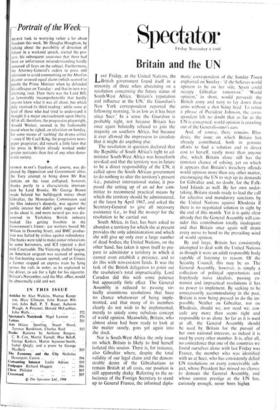Britain and the UN
The resolution in question declared that the Republic of South Africa's right to ad- minister South-West Africa was henceforth revoked and that the territory was in future to be a direct responsibility of the UN; it called upon the South African government to do nothing to alter the territory's present (i.e., putative) international status; it pro- posed the setting up of an ad hoc com- mittee to recommend practical means by which the territory should be administered, at the latest by April 1967. and asked the Secretary-General to give all necessary assistance (i.e., to find the money) for the resolution to be carried out.
South Africa, in fact, has been asked to abandon a territory for which she at present provides the only administration and which she will give up only over a large number of dead bodies; the United Nations, on the other hand, has taken it upon itself to pre- pare to administer a territory in which it cannot even establish a presence. and to do this with non-existent funds. It was the task of the British delegation to point out the resolution's total impracticality. Lord Caradon did this with some patience but apparently little effect. The General Assembly is reduced to passing vir- tually unanimous resolutions that have no chance whatsoever of being imple- mented, and that many of its members clearly do not wish to be implemented, merely to satisfy some nebulous concept of wcirld opinion. Meanwhile. Britain, who almost alone had been ready to look at the matter sanely, goes yet . again into the dock.
Nor is South-West Africa the only issue on which Britain is likely 'to find herself isolated. this session. There is, for instance. also Gibraltar where, despite the total validity of our legal claim and the demon- strable desire of the Gibraltarians to remain British at all costs, our position is still apparently shaky. Referring to the re- luctance of the Foreign Secretary to stand up to General Franco, the informed diplo- matic correspondent of the Sunday Times explained on Sunday : 'if she believes world opinion to be on her side. Spain could occupy Gibraltar tomorrow.' 'World opinion,' in short, would persuade the British army and navy to lay down their arms without a shot being lired. To reline a phrase of President Johnson, the corre- spondent left no doubt that as far as the UN is concerned, world opinion is crawling out of the Generalissimo's ears.
And, of course, there remains Rho- desia, the issue on which Britain has already contributed, both in genuine efforts to find a solution and in direct cost to herself, vastly more than anyone else, which Britain alone still has the remotest chance of solving, yet on which it appears that Britain's treachery offends world opinion more than any other matter, encouraging the UN to step up its demands for Gibraltar and, no doubt, for the Falk- land Islands as well. By her own under- taking. Britain stands ready to lead the call for selective and mandatory sanctions by the United Nations against Rhodesia if there is no negotiated solution in sight by the end of this month. Yet it is quite clear already that the General Assembly will con- sider this contribution totally inadequate and that Britain once again will strain every nerve to bend to the prevailing wind of world opinion.
By and large. Britain has consistently attempted to deal with the United Nations as though it were an adult responsible body capable of listening to reason. Of the Security Council, this may be so. The General Assembly. however, is simply a collection of political opportunists and hopelessly naive idealists, passing ex- tremist and impractical resolutions it has no power to implement. By seeking to be unnecessarily accommodating in the past. Britain is now being pressed to do the im- possible. Neither on Gibraltar, nor on Rhodesia, should we, nor need we, con- cede any more than seems right and responsible to us alone. So far as it is used at all, the General Assembly should be used by Britain for the pursuit of her own national interests, as indeed it is used by every other member. It is, after all, no coincidence that one of the countries we found ourselves alone with last Friday was France, the member who was identified with us at Suez, who has consistently defied UN resolutions on every conceivable sub- ject, whose President has missed no chance to demean the General Assembly, and whose current prestige at the UN has. curiously enough, never been higher.


































 Previous page
Previous page